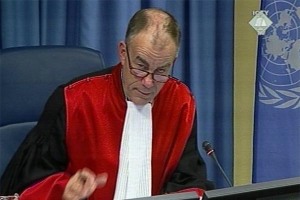Below is the information for a great one week mock trial program slated for July 6-11, 2015 organized by the Association of Defence Counsel Practicing before the ICTY (ADC-ICTY) and International Criminal Law Bureau. Application deadline is May 15, 2015.
The ADC-ICTY is organising another Mock Trial this year with the support of the International Criminal Law Bureau. The Mock Trial is a one week event hosted by the ADC-ICTY in The Hague. The week includes hands-on evening sessions for young professionals in the field of international criminal law and a one day Mock Trial exercise in the ICTY courtroom in front of ICTY Judges and Counsel.
The evening sessions focus on practical skills and expertise and are given by experienced Defence Counsel to prepare participants for a career in international criminal law. Topics include “legal drafting”, “oral trial advocacy”, “opening and closing statements” and “ethics in international criminal law”. Participants will be requested to make written filings in teams as well as perform in the courtroom on the day of the Mock Trial.
Participants will be allocated to one Prosecution team and three Defence teams, or play one of the two witnesses or one of the three accused. Applicants shall inform the ADC-ICTY of their preferred role when submitting an application.
Dates: 6 July – 11 July 2015
Evening sessions between 16:00 and 20:00 on 6-10 July and an all-day in-court exercise on 11 July 2015. Please note that the Mock Trial is a work-intensive week which will require participants to work in teams and simulate a real case. Work in the afternoons and evenings may be required. Please consult the Mock Trial Flyer and Programme 2015 for a tentative programme.
Participation Fee:
- External participants (Defence/OTP) – 160 Euros
- ADC participants (Defence/OTP) – 80 Euros
- External participants (witness/accused) – 80 Euros
- ADC participants (witness/accused) – 40 Euros
This fee includes coffee, tea and biscuits during the evening sessions, lunch on the day of the Mock Trial, extensive material, certificates, etc.
The ADC-ICTY is unable to offer accommodation, transport or any stipends and participants are responsible for arranging their own housing, transport and financial aid as needed.
For more information on how to become an ADC-ICTY Affiliate Member and be eligible for the reduced rate, please visit: http://adc-icty.org/home/membership/index.html
Application:
The deadline for applications is 15 May 2015. Please send your CV and a short motivational statement to adcicty.headoffice@gmail.com. Applications are reviewed on a rolling basis and candidates are chosen on the basis of their background knowledge and experience to allow for a competitive group of participants.
Additional Information:
Please contact the ADC-ICTY Head Office via adcicty.headoffice@gmail.com
for any queries you may have.








